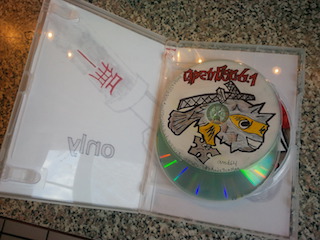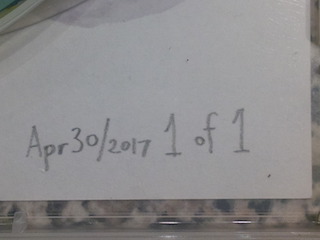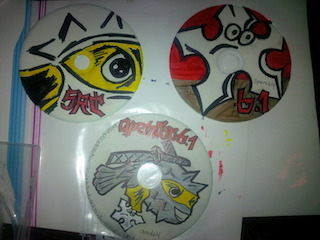Contributed by phessler on from the not-available-in-stores dept.
Now it turns out that in fact, exactly one CD set was made, and it can be yours if you are the successful bidder in the auction that ends on May 13, 2017.
Bob Beck (beck@) writes in to tell us
An "Artisanally Made" collector's edition has been constructed for OpenBSD 6.1 - Featuring artwork actually drawn by Theo, (He took *lessons* to do this!) a short Haiku on the cover, and the 3 CD release set. It's up for auction on ebay to the highest bidder.
The CD set is hand made and signed by Theo de Raadt.
More pictures after the fold:
Click through to the auction to see some more pictures of the CD set!
As with previous OpenBSD auctions, if you are not the successful bidder, we would like to encourage you to donate the equivalent of you highest bid to the project.
(Comments are closed)






By Marc (2001:920:1846:1dc0:527b:9dff:fe2b:2aa8) on
By Renaud Allard (renaud) renaud@allard.it on
Happy betting :)
By Anonymous Coward (24.113.18.65) on
Comments
By Will Backman (24.198.212.248) on
That's why I bought the 6.0 release on CD when they said it was the last set. Those have the signify signatures on them and I figured that I can use those to verify later releases.
By Antonio Gandara (98.193.41.146) on
While I actually did enjoy the physical copies as it came with artwork and instructions which was cool up until OpenBSD 6.0. OpenBSD does provide hash keys to verify the integrity of the ISO files you download when you make your media for OpenBSD 6.1. That is what I did when I burned the OpenBSD 6.1 AMD64 iso to a DVD.
Comments
By Anonymous Coward (24.113.18.65) on
>
> While I actually did enjoy the physical copies as it came with artwork and instructions which was cool up until OpenBSD 6.0. OpenBSD does provide hash keys to verify the integrity of the ISO files you download when you make your media for OpenBSD 6.1. That is what I did when I burned the OpenBSD 6.1 AMD64 iso to a DVD.
>
>
Please describe how you know that these hash keys are the correct ones, and that the ISO files are the correct ones. It is possible to have a MITM with modified copies if someone cares enough to spend the money/effort to do that. While you may think such a thing could never happen, perhaps the future will determine otherwise.
Comments
By ian k (73.77.80.239) ian@ce.gl on ce.gl
please describe how you know that your mail hasn't been tampered with
Comments
By Anonymous Coward (24.113.18.65) on
>
> please describe how you know that your mail hasn't been tampered with
Byzantine fault-tolerance through data replication. Emails to a public list are naturally replicated at a point in time soon after the email is sent. Provide the same information in multiple other places, like IRC and websites makes manipulation of a release more difficult.
By Antonio Gandara (98.193.41.146) on
> >
> > While I actually did enjoy the physical copies as it came with artwork and instructions which was cool up until OpenBSD 6.0. OpenBSD does provide hash keys to verify the integrity of the ISO files you download when you make your media for OpenBSD 6.1. That is what I did when I burned the OpenBSD 6.1 AMD64 iso to a DVD.
> >
> >
>
> Please describe how you know that these hash keys are the correct ones, and that the ISO files are the correct ones. It is possible to have a MITM with modified copies if someone cares enough to spend the money/effort to do that. While you may think such a thing could never happen, perhaps the future will determine otherwise.
Do you read the OpenBSD documentation? One thing I have learned from using BSD UNIX is that the projects always expect you to read the documentation before asking questions. The below text is straight out of the INSTALL.amd64 file which is provided with OpenBSD 6.1. Below it lists the SHA256 and SHA256.sig which contain the hash values to verify install61.iso I downloaded.
INSTALL.amd64 Installation notes; this file.
SHA256 Output of the cksum(1) program using the option
-a sha256, usable for verification of the
correctness of downloaded files.
SHA256.sig The above file, signed with the OpenBSD signing key
for the 6.1 release, usable for verification of the
integrity of the above file, and thus of the
downloaded files.
miniroot61.fs A miniroot filesystem image to be used if you
for some reason can't or don't want to use the
ramdisk installation method.
It can be copied to a small USB key to start the install.
floppy61.fs The standard amd64 boot and installation floppy;
see below.
pxeboot amd64-specific second-stage PXE bootstrap (for
network installs); see below.
*.tgz amd64 binary distribution sets; see below.
bsd A stock GENERIC amd64 kernel which will be
installed on your system during the install.
bsd.mp A stock GENERIC.MP amd64 kernel, with support for
multiprocessor machines, which can be used instead
of the GENERIC kernel after the install.
bsd.rd A compressed RAMDISK kernel; the embedded
filesystem contains the installation tools.
Used for simple installation from a pre-existing
system.
install61.iso The amd64 boot and installation CD-ROM image,
which contains the base and X sets, so that install
or upgrade can be done without network connectivity.
install61.fs A boot and installation image which contains
the base and X sets. An install or upgrade can be
Comments
By Anonymous Coward (24.113.18.65) on
> > >
> > > While I actually did enjoy the physical copies as it came with artwork and instructions which was cool up until OpenBSD 6.0. OpenBSD does provide hash keys to verify the integrity of the ISO files you download when you make your media for OpenBSD 6.1. That is what I did when I burned the OpenBSD 6.1 AMD64 iso to a DVD.
> > >
> > >
> >
> > Please describe how you know that these hash keys are the correct ones, and that the ISO files are the correct ones. It is possible to have a MITM with modified copies if someone cares enough to spend the money/effort to do that. While you may think such a thing could never happen, perhaps the future will determine otherwise.
>
> Do you read the OpenBSD documentation? One thing I have learned from using BSD UNIX is that the projects always expect you to read the documentation before asking questions. The below text is straight out of the INSTALL.amd64 file which is provided with OpenBSD 6.1. Below it lists the SHA256 and SHA256.sig which contain the hash values to verify install61.iso I downloaded.
>
>
> INSTALL.amd64 Installation notes; this file.
>
> SHA256 Output of the cksum(1) program using the option
> -a sha256, usable for verification of the
> correctness of downloaded files.
>
> SHA256.sig The above file, signed with the OpenBSD signing key
> for the 6.1 release, usable for verification of the
> integrity of the above file, and thus of the
> downloaded files.
>
> miniroot61.fs A miniroot filesystem image to be used if you
> for some reason can't or don't want to use the
> ramdisk installation method.
> It can be copied to a small USB key to start the install.
>
> floppy61.fs The standard amd64 boot and installation floppy;
> see below.
>
> pxeboot amd64-specific second-stage PXE bootstrap (for
> network installs); see below.
>
> *.tgz amd64 binary distribution sets; see below.
>
> bsd A stock GENERIC amd64 kernel which will be
> installed on your system during the install.
>
> bsd.mp A stock GENERIC.MP amd64 kernel, with support for
> multiprocessor machines, which can be used instead
> of the GENERIC kernel after the install.
>
> bsd.rd A compressed RAMDISK kernel; the embedded
> filesystem contains the installation tools.
> Used for simple installation from a pre-existing
> system.
>
> install61.iso The amd64 boot and installation CD-ROM image,
> which contains the base and X sets, so that install
> or upgrade can be done without network connectivity.
>
> install61.fs A boot and installation image which contains
> the base and X sets. An install or upgrade can be
Please re-read the sentence above your post and you will understand why this is off-topic.
By Edward Ahlsen-Girard (Ed) eagirard@cox.net on
Comments
By Edward Ahlsen-Girard (Ed) on
>
And also, are posters and stickers a thing of the past now as well?